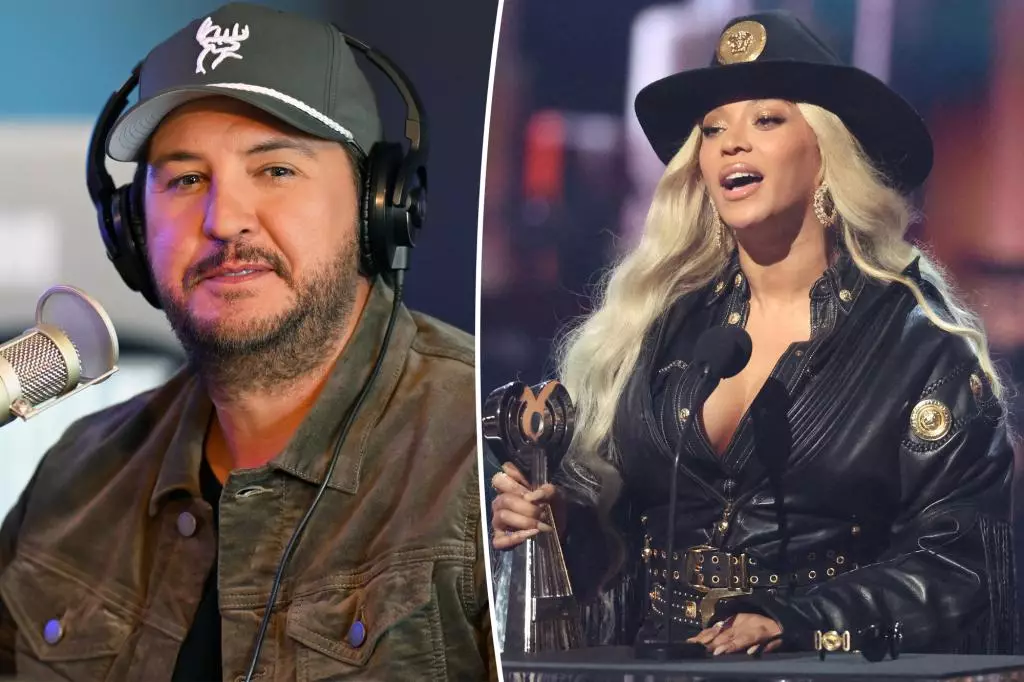The recent discussion surrounding Beyoncé’s exclusion from the Country Music Association (CMA) Awards nominations, despite the success of her debut country album, “Cowboy Carter,” has stirred deep conversations within the music industry. These dialogues go beyond mere award recognitions. They delve into the broader themes of genre authenticity, perceptions of belonging, and what it means to embody ‘country’ in today’s music landscape. Luke Bryan’s comments on the subject raise not only questions about inclusivity in country music but also the cultural nuances that govern an artist’s acceptance within a genre steeped in tradition and collaboration.
In an appearance on SiriusXM’s “Andy Cohen Live,” Luke Bryan expressed mixed feelings about Beyoncé’s entry into the country music scene. While he acknowledged the excitement that her album brought to the charts, he suggested a need for a deeper engagement with the genre and its community. Bryan’s statement highlights a sentiment echoing in many musical circles: it’s not enough for an artist to simply release a project in a different genre; there is an expectation of commitment to the culture that underlies that genre. He emphasized that for Beyoncé to be wholly accepted into the country music family, she needed to participate in the community, which values relationships and shared experiences.
This assertion, however, opens the door to further scrutiny. Is acceptance contingent upon participation alone, or does the expectation of belonging reveal a deeper exclusivity within country music? Bryan certainly means well in advocating for engagement, yet his comments can also risk reinforcing barriers rather than breaking them down.
Bryan also touched on the passionate support from Beyoncé’s fans, widely known as the Beyhive, noting their fervent pushback against the CMA’s decision. This highlights an inherent conflict in the ever-blurring lines of genre fan bases—the visibility of one’s existing audience can pose challenges when intermingling with a community that might see such dynamics as a threat to their traditional framework.
Beyoncé’s situation resonates with other artists who have ventured into eclectic sounds, like Kelly Clarkson, who candidly reflected on the struggles she faced while trying to intersect pop with country. Clarkson’s recollections shed light on the often-guarded nature of country music’s community and how it can inadvertently alienate artists striving to innovate.
The sentiments shared by Dolly Parton provide further nuance to the discourse. Parton defended the CMA voting body, suggesting that the organization must prioritize those who have traditionally dedicated themselves to the genre—suggesting a historical weigh in the nominations process that could undermine efforts to recognize newcomers. While acknowledging Beyoncé’s contributions, Parton expressed that existing artists must be recognized for their commitment to the genre, implying a historical snobbery that has long dictated the hierarchy and inclusivity within country music.
Such insights raise critical questions: What does it mean for something to be authentically country, and who gets to decide? The flexibility of genre distinctions in modern music complicates traditional definitions. If an artist such as Beyoncé, who has built a resonant legacy in pop, steps into a new genre, how do we fairly evaluate her contribution alongside those of artists steeped in the country music lineage?
Beyoncé herself acknowledged the complexities of entering the country genre in her statements about her album, revealing how her experiences motivated her to understand the roots of country music more profoundly. She expressed that her journey was about not only creating a vibrant space for herself but also challenging the expectations that were placed upon her. This encapsulation of her experience reflects a larger journey for many artists: navigating the industry’s expectations while remaining true to themselves.
As music fans and critics navigate these changing tides, they must also confront their biases and beliefs about genre, authenticity, and recognition. The dialogue ignited by Beyoncé’s situation serves as a crucial reminder that music is an evolving landscape, shaped by diverse voices that challenge us to reconsider who we include and celebrate in various music communities.
The CMA Awards snub may not be just a minor incident in the awards calendar; instead, it symbolizes the layers of identity, belonging, and resistance prevalent in the music industry today. Ultimately, it presents an invitation for all stakeholders—artists, fans, and industry leaders—to review their approaches towards inclusivity, community, and the very definition of what a genre truly represents.

Leave a Reply